
John Hagel is a management consultant and author who specializes in helping executives to anticipate and address emerging business opportunities and challenges. He is the founder and co-chairman of Deloitte‘s Center for the Edge. I don’t know John but I love his work, especially his blog posts (see this post on spirit set), not only … Continue reading John Hagel Management Consultant & Author

Nora Bateson is a filmmaker, writer, and educator, as well as President of the International Bateson Institute, based in Sweden. Understanding Complexity | Nora Bateson WebsiteThe International Bateson InstituteLinkedinNora BatesonBlogNora BatesonRSS FeedNora BatesonTwitter@norabatesonYouTubeNora BatesonGoogleNora Bateson Twitter Tweets by Nora Bateson RSS FeedBooks: Nora BatesonComplex Problems Require an Entirely Different Approach in Assessment, and Action Nora … Continue reading Nora Bateson Filmmaker, writer, and educator

Posts where this video is embedded Navigating Complexity with Safe-to-fail Probes The power of safe-to-fail probesPeople: Jennifer Garvey BergerJennifer Garvey Berger Developmental coach and authorBooks: Jennifer Garvey BergerJennifer Garvey Berger Developmental coach and authorListening to Learn Jennifer Garvey Berger (2017)Making Sense of Complexity – an Introduction to Cynefin Jennifer Garvey Berger (2017)Safe-to-fail Experiments Jennifer Garvey Berger … Continue reading Safe-to-fail Experiments Jennifer Garvey Berger (2018)

The major problems in the world are the result of the difference between how nature works and the way people think. | Gregory Bateson Continue reading What Is the Root Cause of the Major Problems in the World? Gregory Bateson

Dr. Glenda Eoyang is an author and the founding director of the Human Systems Dynamics Institute. What makes human systems dynamics different? | Glenda Eoyang WebsiteHuman Systems Dynamics InstituteWikipediaGlenda EoyangTwitter@glendaeoyangYouTubeGlenda EoyangGoogleGlenda Eoyang Twitter Tweets by Glenda Eoyang Books: Glenda EoyangGlenda Eoyang Author and founding director of the Human Systems Dynamics InstituteTags: complexity (93) | Glenda … Continue reading Glenda Eoyang Author and founding director of the Human Systems Dynamics Institute

Unlike a journalist, almost surely you are using your writing process to help yourself think. In other words, the thinking that you’re doing is at such a level of complexity that you have to use writing to help yourself do your thinking. | Larry McEnerney Continue reading You Have to Use Writing to Help Yourself Do Your Thinking Larry McEnerney

The problems the world is facing now, including ecological damage, natural disasters, poverty, species loss, political upheaval, refugee trauma, and even health epidemics, can all be described as complex, that is, they are born of circumstances that are multi-causal and non-linear. This complexity vexes the traditional problem-solving model of … | Nora Bateson Continue reading Complex Problems Require an Entirely Different Approach in Assessment, and Action Nora Bateson

In an increasingly complex world, appointed leaders simply don’t know enough to decide what is new and better. Leadership is a group sport, not an individual heroic activity. | Edgar Schein Continue reading Leadership Is a Group Sport, Not an Individual Heroic Activity Edgar Schein

This book Cynefin – Weaving Sense-Making into the Fabric of Our World chronicles the origin story and historical evolution of the Cynefin Framework, including personal vignettes where network members share how it has impacted their lives, and reflections by practitioners on how they have applied it across many diverse contexts. AustraliaAustriaBrazilCanadaChinaCzech RepublicEgyptFranceGermanyGlobalIndiaItalyJapanMexicoNetherlandsPolandSaudia ArabiaSingaporeSpainTurkeyUAEUnited KingdomUnited … Continue reading Cynefin – Weaving Sense-making Into the Fabric of Our World by Dave Snowden & friends (2020)

Sonja Blignaut is the founder of More Beyond and has been working in the fields of narrative and complexity since 2002. I have followed Sonja’s work for almost 20 years but only personally know her a little. What I like about her work in complexity is her ability to talk about it in everyday language … Continue reading Sonja Blignaut Complexity consultant

Karl Popper, the great philosopher of science, once divided the world into two categories: clocks and clouds. Clocks are neat, orderly systems that can be solved through reduction; clouds are an epistemic mess, “highly irregular, disorderly, and more or less unpredictable.” The mistake of modern science is to pretend that everything is a clock, … | Jonah Lehrer Continue reading Clouds Not Clocks Jonah Lehrer

Many people believe that complexity is just higher-order complicatedness i.e. that there is a continuum and that the difference is one of degree, not type. When one considers however how very different these states are from each other, I tend to agree with Dave Snowden when he says that there are in fact phase shifts between them i.e. they are … | Sonja Blignaut Continue reading Complex and Complicated Systems Are Fundamentally Different Sonja Blignaut

Unintended consequences get to the heart of why you never really understand an adaptive problem until you have solved it. Problems morph and “solutions” often point to deeper problems. In social life, as in nature, we are walking on a trampoline. Every inroad reconfigures the environment we tread on. | The Power of Positive Deviance Continue reading We Are Walking on a Trampoline Richard Pascale, Jerry Sternin, Monique Sternin

Patricia Shaw was formerly a professor at the Business School of the University of Hertfordshire, where she co-founded the Complexity and Management Centre in 1995 with Ralph Stacey and Doug Griffin. She was also formerly a Visiting Professor at the Copenhagen Business School. She is now a fellow at Schumacher College. YouTubePatricia ShawGooglePatricia ShawPosts: Patricia … Continue reading Patricia Shaw Fellow at Schumacher College

What is complex leadership? It starts by understanding the strengths and vulnerabilities of group dialogue. It uses this knowledge to leverage cognitive diversity within a group. | Ted Cadsby Continue reading What Is Complex Leadership? Ted Cadsby

Long-term planning is irrelevant, if not a hindrance. Strategy should not be about the realisation of prior intent, but rather emphasis on the importance of openness to accident, coincidence and serendipity. Strategy in this case is the emergent resultant. Successful strategies, especially in the long term, do not result from fixing an … | Mee-Yan Cheung-Judge Continue reading Long-term Planning Is Irrelevant, If Not a Hindrance Mee-Yan Cheung-Judge

Jean Boulton is a director, strategy consultant, and part-time academic at both Bath and Cranfield universities. She writes, teaches and, researches in the area of complexity theory as applied to strategy, organization development, policy, and social change. Jean Boulton: Complexity as Worldview WebsiteEmbracing ComplexityLinkedinJean BoultonYouTubeJean BoultonFacebookJean BoultonGoogleJean BoultonBooks: Jean BoultonEmbracing Complexity Can Actually Makes Things … Continue reading Jean Boulton Visiting Fellow, Cranfield School of Management

In this book, Leadership in Complexity and Change, Sharon Varney draws on complexity science to paint a picture of a world in constant motion, where leadership is enacted in the midst of complexity and continuous change. We must learn to engage with complexity. If not now, when? Part I of this book brings complexity science … Continue reading Leadership in Complexity and Change: for a World in Constant Motion by Sharon Varney (2021)

AustraliaAustriaBrazilCanadaChinaCzech RepublicEgyptFranceGermanyGlobalIndiaItalyJapanMexicoNetherlandsPolandSaudia ArabiaSingaporeSpainTurkeyUAEUnited KingdomUnited States As an Amazon Associate, I earn a small commission when you purchase a book via this site. People: Jean BoultonJean Boulton Visiting Fellow, Cranfield School of ManagementBooks: Jean BoultonEmbracing Complexity Can Actually Makes Things Easier, Simpler, and More Straightforward Jean BoultonEmbracing Complexity: Strategic Perspectives for an Age of … Continue reading Embracing Complexity: Strategic Perspectives for an Age of Turbulence by Jean G. Boulton, Peter M. Allen, Cliff Bowman (2015)

The Cynefin Framework | Dave Snowden Posts that link to this post We Humans Are Complex Human socio-technical systems are complexPeople: Dave SnowdenDave Snowden Management ConsultantPosts: Dave SnowdenCarpe Diem – Seize the Day Seize the day everyoneChanging People ** The challenge of trying to change peopleConversations Through the Cynefin Lens Unraveling the intricacies of everyday conversationsThe … Continue reading The Cynefin Framework Dave Snowden

The world is a thing of utter inordinate complexity and richness and strangeness that is absolutely awesome. I mean the idea that such complexity can arise not only out of such simplicity but probably absolutely out of nothing, is the most fabulous extraordinary idea. And once you get some kind of inkling of how that might have happened, it’s just … | Douglas Adams Continue reading The World Is a Thing of Utter Inordinate Complexity and Richness Douglas Adams

What is easy to miss in saying all this is that embracing complexity can actually makes things easier, simpler, and more straightforward! How much time gets spent by organizations making cases, forming detailed plans, completing analyses, and demonstrating outcomes? How much of this really gets to the heart of the situation and really determines … | Jean Boulton Continue reading Embracing Complexity Can Actually Makes Things Easier, Simpler, and More Straightforward Jean Boulton

Jennifer Garvey Berger is a developmental coach and author. WebsiteCultivating LeadershipLinkedinJennifer Garvey BergerBlogCultivating LeadershipTwitter@jgbergerYouTubeJennifer Garvey BergerGoogleJennifer Garvey Berger Twitter Tweets by Jennifer Garvey Berger Books: Jennifer Garvey BergerJennifer Garvey Berger Developmental coach and authorListening to Learn Jennifer Garvey Berger (2017)Making Sense of Complexity – an Introduction to Cynefin Jennifer Garvey Berger (2017)Safe-to-fail Experiments Jennifer Garvey … Continue reading Jennifer Garvey Berger Developmental coach and author

The whole process of nature is an integrated process of immense complexity, and it’s really impossible to tell whether anything that happens in it is good or bad — because you never know what will be the consequence of the misfortune; or, you never know what will be the consequences of good fortune. | Alan Watts Continue reading Nature Is an Integrated Process of Immense Complexity Alan Watts

Dave Pollard is a writer on culture, complexity, deep ecology, civilization’s collapse, and the sharing economy. Although I have only ever met Dave once, many years ago, through his writing, he has had a considerable influence on me over the years. His insights into the nature of conversation and complexity never cease to provoke my … Continue reading Dave Pollard Writer on culture, complexity, ecology, civilization’s collapse and the sharing economy

Daniel Kahneman is a psychologist and economist notable for his work on the psychology of judgment and decision-making, as well as behavioral economics. Thinking, Fast and Slow | Daniel Kahneman WikipediaDaniel KahnemanYouTubeDaniel KahnemanGoogleDaniel KahnemanBooks: Daniel KahnemanBelief Coherence Daniel KahnemanDaniel Kahneman Psychologist and behavioral economistFor Some of Our Most Important Beliefs, We Have No Evidence at … Continue reading Daniel Kahneman Psychologist and behavioral economist

I have long argued, and repeated ad nauseam that in complexity we start journeys with a sense of direction we don’t try and achieve goals. We remain open to the evolutionary opportunities of the here and now, the present and the adjacent future states. | Dave Snowden Continue reading In Complexity We Start Journeys with a Sense of Direction Dave Snowden

Chris Rodgers is an organizational change consultant, facilitator, and coach. I have known Chris for many years and have been greatly influenced by the insights in his blog into complexity, conversation, and leadership. LinkedinChris RodgersBlogInformal CoalitionsTwitter@ChrisPRodgersYouTubeChris RodgersGoogleChris Rodgers Twitter Tweets by Chris Rodgers Books: Chris RodgersChris Rodgers Organizational change consultantTags: Chris Rodgers (1) | complexity … Continue reading Chris Rodgers Organizational change consultant

Dan Kahan is the Elizabeth K. Dollard Professor of Law & Professor of Psychology at Yale Law School. His primary research interests are risk perception, science communication, and the application of decision science to law and policymaking. Motivated numeracy and enlightened self-government WebsiteDan KahanWikipediaDan KahanBlogThe Cultural Cognition ProjectRSS FeedThe Cultural Cognition ProjectTwitter@cult_cognitionYouTubeDan KahanGoogleDan Kahan Twitter … Continue reading Dan Kahan Professor of Psychology at Yale Law School

A culture is emergent and is the result of millions of interactions, behaviours, artifacts and stories that people build up over time. It is unpredictable and results in surprise. The idea that a “culture change initiative” can be rolled out from the top of an organization is not only a myth, it’s a hidden form of colonization. And worse, the idea that people need to be changed in the way the … | Chris Corrigan Continue reading Culture Is Emergent Chris Corrigan

Dr. Naomi Stanford is an organization design practitioner, teacher, and author. I don’t know Naomi but have seen her speak at the Henley Forum on complexity and was impressed with her work. I have been following her blog ever since and learned a great deal from her. Exploring workplace bravery | Naomi Stanford LinkedinNaomi StanfordBlogNaomi … Continue reading Naomi Stanford Organization Design Consultant

Abstract The 2030 Sustainable Development Agenda includes 17 inter-related Sustainable Development Goals (SDGs), each representing complex systems — such as climate, food, health, cities — with myriad stakeholders. Achieving progress on this agenda requires a departure from traditional top-down, hierarchical and linear approaches to implementing change. Instead, it requires innovative and adaptive approaches that engage … Continue reading Systems Leadership for Sustainable Development Lisa Dreier, David Nabarro and Jane Nelson (September 2019)

To really work conversationally, I think, is potentially to be really open to the complexity of what being human is like. | Johnnie Moore Continue reading To Really Work Conversationally Johnnie Moore, 2023

Dave Snowden is a Welsh management consultant and researcher in the field of knowledge management. Known for the development of the Cynefin framework, he is the founder and chief scientific officer of The Cynefin Company, a Singapore-based management consulting firm specializing in complexity and sensemaking. I have known Dave for many years and follow his … Continue reading Dave Snowden Management Consultant

A clear, succinct 5 minutes introduction to Dave Snowden’s Cynefin Framework by Jennifer Garvey Berger. Making Sense of Complexity – an introduction to Cynefin | Jennifer Garvey Berger Posts where this video is embedded Jennifer Garvey Berger Developmental coach and author The Cynefin Framework A conceptual framework to help make decisionsPeople: Jennifer Garvey BergerJennifer Garvey Berger Developmental … Continue reading Making Sense of Complexity – an Introduction to Cynefin Jennifer Garvey Berger (2017)

Abstract Although innovation is one of the most commonly mentioned concepts in social science unintended undesirable consequences of innovation are rarely studied. This study does a literature review of all articles in the EBSCO database, with innovation in the title and which study undesirable consequences. We found only 26 such articles; 1 per 1000, a … Continue reading Unintended and Undesirable Consequences of Innovation Karl-Erik Sveiby, Pernilla Gripenberg, Beata Segercrantz, Andreas Eriksson, Alexander Aminoff (2009)

Posts where this video is embedded Dave Snowden Management Consultant Exploring Uncertainty – the Role of Catalytic and Safe-to-fail Probes Essential Tools for Understanding and Influencing Complex SystemsPeople: Dave SnowdenDave Snowden Management ConsultantPosts: Dave SnowdenCarpe Diem – Seize the Day Seize the day everyoneChanging People ** The challenge of trying to change peopleConversations Through the Cynefin Lens … Continue reading How to Organize a Children’s Party Dave Snowden

Ralph Stacey is an organizational theorist and Professor of Management at Hertfordshire Business School, University of Hertfordshire, in the UK. Complexity and Paradoxes | Ralph Stacey WikipediaRalph StaceyYouTubeRalph StaceyGoogleRalph StaceyPosts: Ralph StaceyComplex Responsive Processes Ongoing patterns of interaction between peopleConversations Are Complex Responsive Processes Conversations are dynamic, emergent interactions shaping organizational realityWe Humans Are Complex … Continue reading Ralph Stacey Professor of Management

Ted Cadsby is an author and researcher, writer and speaker on complexity and decision-making. I don’t know Ted and although he does not use the term Conversational Leadership, he does get close when he talks about Complex Leadership. He is one of a handful of people who are writing and talking about the power of … Continue reading Ted Cadsby Author and researcher, writer and speaker on complexity and decision-making.

Listening to Learn | Jennifer Garvey Berger People: Jennifer Garvey BergerJennifer Garvey Berger Developmental coach and authorBooks: Jennifer Garvey BergerJennifer Garvey Berger Developmental coach and authorListening to Learn Jennifer Garvey Berger (2017)Making Sense of Complexity – an Introduction to Cynefin Jennifer Garvey Berger (2017)Safe-to-fail Experiments Jennifer Garvey Berger (2018)Videos: Jennifer Garvey BergerListening to Learn Jennifer … Continue reading Listening to Learn Jennifer Garvey Berger (2017)

In this book, Future Minds, Richard Yonck challenges our assumptions about intelligence — what it is, how it came to exist, and its place in the development of life on Earth and possibly throughout the cosmos. Taking a Big History perspective — over the 14 billion years from the Big Bang to the present and … Continue reading Future Minds: the Rise of Intelligence From the Big Bang to the End of the Universe by Richard Yonck

Understanding the distinction between ‘complicated’ and ‘complex’ is crucial. This insight transforms our approach to problem-solving, highlighting that complicated problems need expert solutions, while complex issues require adaptive, emergent strategies. Further Reading There Are No Solutions to Complex Problems Connection Before Content This page is part of a blook on Conversational Leadership. Parts of this book … Continue reading Complex Is Not the Same as Complicated Change Insight

Esko Kilpi was the founder and principal of Esko Kilpi Oy, a research and consultancy firm based in Finland working with the challenges of knowledge work and digital work environments. I knew Esko for many years and was particularly influenced by his thinking on the future of organizations and of work. I was so sad … Continue reading Esko Kilpi Researcher and strategist

We have always struggled as human beings. But our struggle today is exacerbated by a gap between the increasingly complicated world we have created and the default ways we think about it. Twenty-first-century challenges are qualitatively different from those that generations of our ancestors faced, yet our thinking has not evolved to keep pace. We … Continue reading Closing the Mind Gap: Making Smarter Decisions in a Hypercomplex World by Ted Cadsby (2014)

Abstract Many executives are surprised when previously successful leadership approaches fail in new situations, but different contexts call for different kinds of responses. Before addressing a situation, leaders need to recognize which context governs it -and tailor their actions accordingly. Snowden and Boone have formed a new perspective on leadership and decision making that’s based … Continue reading A Leader’s Framework for Decision Making David J. Snowden and Mary E. Boone (2007)

The sciences of complexity change our perspective and thinking. Perhaps, as a result we should, especially in management, focus more attention on what we are doing than what we should be doing. Following the thinking presented by the most advanced scientific researchers, the important question to answer is not what should happen in the future, but … | Esko Kilpi Continue reading The Sciences of Complexity Change Our Perspective and Thinking Esko Kilpi

There is a gap between the complicated world we have created and the default ways we think about it. We need greater complexity in our thinking to match the complexity in our world. | Ted Cadsby Continue reading A Complex World Demands Complex Thinking Ted Cadsby

Complex problems aren’t actually problems at all. They are non-determinate systems, systems that change based on how we engage with them. Push on one part of a complex problem and a different part will change the system. Healthcare, climate and technology systems are all complex problems. | Seth Godin Continue reading Complex Problems Aren’t Actually Problems at All Seth Godin

We can no longer see ourselves as separate from the natural world or our technology, but as a part of them, integrated, codependent, and entangled. Credit: Danny Hillis Comment: When we accept our entanglement with nature and technology, we shift from control to collaboration. This is the essence of Conversational Leadership in a complex world.Source: … Continue reading The Entangled Age Danny Hillis (2016)

Nurturing an innovative culture goes beyond traditional management and control methods. Many initiatives fail by trying to enforce change through rigid directives, which can backfire. Instead, culture should be seen as emergent, evolving naturally through interactions, flexibility, and supportive environments where creativity can thrive. Continue reading Nurturing an Innovation Culture Allowing emergence, not imposing change

Ralph Stacey’s book, “Complex Responsive Processes in Organizations: Learning and Knowledge Creation,” delves into the intricacies of organizational dynamics, focusing on the interplay between human behavior, decision-making, and knowledge generation within complex systems. Drawing from complexity theory, Stacey explores how organizations are not merely static structures but evolving, adaptive entities shaped by the actions and … Continue reading Complex Responsive Processes in Organizations: Learning and Knowledge Creation by Ralph Stacey (2001)
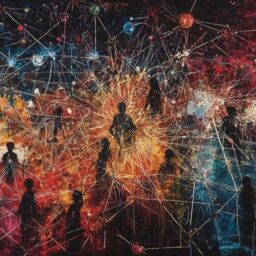
Retrospective Coherence in a Complex World What Is a System? ** Close Pop-up all posts in this chapter What’s the Vibe? Please be patient as this may take up to a minute to load… Close The world is fast-changing and increasingly more turbulent. The problems and challenges we face are both complex and adaptive and … Continue reading Introduction: Complexity The world is fast-changing and increasingly more turbulent

The book “Changing Conversations in Organizations” by Patricia Shaw explores a complexity-informed approach to organizational change that focuses on the self-organizing and emergent properties of conversation. Shaw suggests that real change happens through the ongoing, everyday conversations and interactions between people in organizations rather than through structured change programs or interventions designed and controlled by … Continue reading Changing Conversations in Organizations: A Complexity Approach to Change by Patricia Shaw (2002)

The Cynefin Framework categorizes problems into distinct domains. Understanding the difference between ‘complicated’ and ‘complex’ is critical. This clarity enhances decision-making and problem-solving strategies. Continue reading Complex Is Not the Same as Complicated We tend to use “complex” to describe things that are actually just complicated or challenging.

Complex Is Not the Same as Complicated Complex Systems ** Close Pop-up all posts in this chapter What’s the Vibe? Please be patient as this may take up to a minute to load… Close Distinguishing between complex systems and complex adaptive systems is essential. The challenge is that these terms are often used interchangeably. By … Continue reading Complex Systems and Complex Adaptive Systems ** Complexity
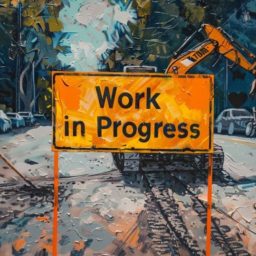
Complex Systems and Complex Adaptive Systems ** Complex Adaptive Systems ** Close Pop-up all posts in this chapter What’s the Vibe? Please be patient as this may take up to a minute to load… Close Complex Systems A complex system consists of many highly interconnected parts that dynamically interact with each other. The Internet and … Continue reading Complex Systems ** Many parts interacting with each other in multiple ways

Complex Systems ** Complex Responsive Processes Close Pop-up all posts in this chapter What’s the Vibe? Please be patient as this may take up to a minute to load… Close Understanding Complex Adaptive Systems A complex adaptive system (CAS) is a type of system composed of numerous interconnected agents that interact with each other and … Continue reading Complex Adaptive Systems ** Complexity
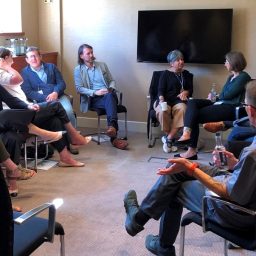
Complex Adaptive Systems ** Constraints in Complex Systems Close Pop-up all posts in this chapter What’s the Vibe? Please be patient as this may take up to a minute to load… Close Organizations are dynamic entities shaped by the interactions and relationships of their members. Traditional systems thinking often fails to account for this complexity. … Continue reading Complex Responsive Processes Ongoing patterns of interaction between people

This blook is not just about me. Numerous people, some living, some not, have understood the power of conversation, appreciated the complexity of the world, and have influenced my thinking. You will find the profiles of a few of these people here. The list below is a subset of these people, whose prime focus is … Continue reading Complexity Thinkers It’s the fringe thinkers who change the world
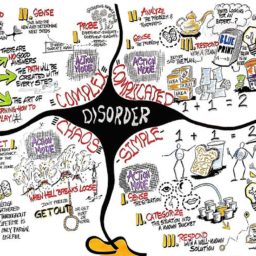
Constraints in Complex Systems Complex Adaptive Systems Vs. Complex Responsive Processes ** Close Pop-up all posts in this chapter What’s the Vibe? Please be patient as this may take up to a minute to load… Close The Cynefin framework helps you make better decisions by helping you understand your situation/context and use an appropriate decision-making … Continue reading The Cynefin Framework A conceptual framework to help make decisions

The Cynefin Framework Conversations Are Complex Responsive Processes Close Pop-up all posts in this chapter What’s the Vibe? Please be patient as this may take up to a minute to load… Close Complex Adaptive Systems (CAS) Overview Complex Adaptive Systems (CAS) are systems composed of many interacting components or agents that adapt or learn based … Continue reading Complex Adaptive Systems Vs. Complex Responsive Processes ** Complexity

Complex Adaptive Systems Vs. Complex Responsive Processes ** Conversations Through the Cynefin Lens Close Pop-up all posts in this chapter What’s the Vibe? Please be patient as this may take up to a minute to load… Close Conversations are a familiar part of daily life, yet their complexity often goes unnoticed. Beneath the surface, they … Continue reading Conversations Are Complex Responsive Processes Conversations are dynamic, emergent interactions shaping organizational reality

Conversations Through the Cynefin Lens Emergence in Complex Systems ** Close Pop-up all posts in this chapter What’s the Vibe? Please be patient as this may take up to a minute to load… Close In today’s complex world, the ability to effectively navigate and respond to different situations and contexts is crucial. This is where … Continue reading Dispositional States ** Complexity

Dispositional States ** The Vector Theory of Change Close Pop-up all posts in this chapter What’s the Vibe? Please be patient as this may take up to a minute to load… Close Emergence in a complex system refers to the phenomenon where new patterns, behaviors, or properties arise at the system level that cannot be … Continue reading Emergence in Complex Systems ** Complexity

Traditional change management methods, with their rigid plans and fixed outcomes, often struggle in today’s complex, unpredictable environments. Dave Snowden’s Vector Theory of Change offers a more adaptable solution by focusing on setting a broad direction (vector) rather than a specific goal. Continue reading The Vector Theory of Change Navigating change in a complex world
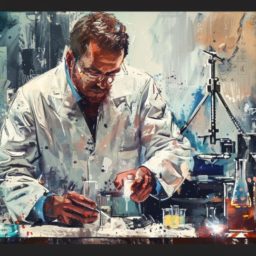
The Vector Theory of Change Exploring Uncertainty – the Role of Catalytic and Safe-to-fail Probes Close Pop-up all posts in this chapter What’s the Vibe? Please be patient as this may take up to a minute to load… Close Navigating complex systems requires innovative problem-solving approaches. Traditional linear methods often prove ineffective in unpredictable environments. … Continue reading Navigating Complexity with Safe-to-fail Probes The power of safe-to-fail probes

Navigating Complexity with Safe-to-fail Probes Technical Challenges and Complex Adaptive Challenges Close Pop-up all posts in this chapter What’s the Vibe? Please be patient as this may take up to a minute to load… Close Navigating complexity requires experimental techniques. Catalytic probes stimulate system reactions, while safe-to-fail probes allow controlled failure. Both enable learning and … Continue reading Exploring Uncertainty – the Role of Catalytic and Safe-to-fail Probes Essential Tools for Understanding and Influencing Complex Systems

Biological Intelligence Artificial Intelligence ** Close Pop-up all posts in this chapter What’s the Vibe? Please be patient as this may take up to a minute to load… Close Systemic intelligence is the emergent adaptive capacities that arise within complex systems comprised of interacting components. It is the system’s ability to self-organize, adapt, and respond … Continue reading Systemic Intelligence The adaptive, self-organizing ability within complex systems

Exploring Uncertainty – the Role of Catalytic and Safe-to-fail Probes There Are No Solutions to Complex Challenges Close Pop-up all posts in this chapter What’s the Vibe? Please be patient as this may take up to a minute to load… Close Navigating challenges is crucial, but the type of challenge matters greatly. There are two … Continue reading Technical Challenges and Complex Adaptive Challenges Distinguishing between straightforward and complex challenges

Technical Challenges and Complex Adaptive Challenges Unintended Consequences Close Pop-up all posts in this chapter What’s the Vibe? Please be patient as this may take up to a minute to load… Close Complex systems defy simplistic problem-solving. Rather than definitive solutions, we can only respond to the intricate web of interconnected elements. In a complex … Continue reading There Are No Solutions to Complex Challenges Only an endless series of adaptive responses
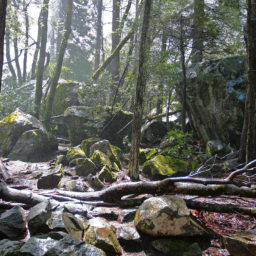
Unintended consequences are outcomes of an action that are not intended or foreseen. Most such consequences are undesirable. Continue reading Unintended Consequences In a complex system, every purposeful action produces unintended consequences

In an unpredictable world, achieving complex goals through direct methods often fails. Traditional, rigid planning can fall apart under changing circumstances. Embracing obliquity—an indirect, adaptive approach—leads to success by allowing flexibility, learning from failures, and focusing on meaningful pursuits. Continue reading Obliquity in a Complex World In a complex world, goals are often best achieved indirectly

Understanding complexity in today’s world requires a new perspective. Traditional methods struggle with the deep interconnectedness of modern systems, leading to unpredictable outcomes. Embracing the concept of entanglement helps us navigate these complexities by recognizing the need for adaptive and integrated approaches. Continue reading From Enlightenment to Entanglement Adapting to the complexities of an interconnected world

Human history spans 200,000 years, marked by a significant shift from survival in the natural world to today’s entangled, complex socio-technical world. Our brains, shaped for simpler times, struggle to navigate this new complexity. To survive, we must adapt our thinking to better understand and manage the interconnected challenges of today’s world. Continue reading Two Worlds Learning to live in an entangled world
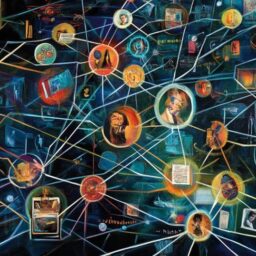
Actor-network theory (ANT) deepens our understanding of complex systems by recognizing the role of non-human entities. However, focusing solely on these can overlook human agency. By including human interpretation and decision-making, ANT offers a richer, more nuanced view of how change unfolds in complex systems. Continue reading The Role of Human Agency Within Actor-network Theory Actor-network theory

V. Nurture Community I. Take Responsibility Close Pop-up all posts in this chapter What’s the Vibe? Please be patient as this may take up to a minute to load… Close The problem – our world is a mess. The context – our world is complex. The outcome – our old ways of working are failing—the … Continue reading Introduction: Principles of Conversational Leadership The Principles of Conversational Leadership

I. Take Responsibility III. Practice Leadership Close Pop-up all posts in this chapter What’s the Vibe? Please be patient as this may take up to a minute to load… Close Embrace complexity: The world and how we live and work together are becoming increasingly interconnected and massively more complex. Complex problems have unique characteristics that … Continue reading II. Embrace Complexity We need to understand complexity & its implications

Our World Is Hyperconnected We Humans Are Complex Close Pop-up all posts in this chapter What’s the Vibe? Please be patient as this may take up to a minute to load… Close In our hyperconnected world, complexity has surged, leading to heightened volatility, uncertainty, and ambiguity. This increased complexity poses significant challenges in predicting outcomes, … Continue reading Our World Is Complex It is a VUCA world

We Humans Are Complex What Is the Metacrisis Close Pop-up all posts in this chapter What’s the Vibe? Please be patient as this may take up to a minute to load… Close In this complex world, our accustomed ways of perceiving, thinking, working, and living are no longer effective and, more often than not, do … Continue reading Our Old Ways of Thinking and Working Are Failing The outcome

The Many Faces of Strategy ** Strategic Conversations Close Pop-up all posts in this chapter What’s the Vibe? Please be patient as this may take up to a minute to load… Close What is meant by strategy, and how do you develop a strategy in a complex world? In a complex and unpredictable world, strategy … Continue reading Strategy in a Complex World ** Strategy is much more than a plan

Say So, If You Don’t Have an Opinion Owning Our Mistakes ** Close Pop-up all posts in this chapter What’s the Vibe? Please be patient as this may take up to a minute to load… Close Carpe diem is a Latin aphorism, usually translated as “seize the day” or “pluck the day [as it is … Continue reading Carpe Diem – Seize the Day Seize the day everyone
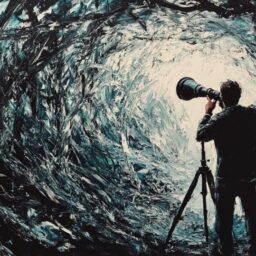
The Role of Human Agency Within Actor-network Theory Introduction: Complexity Close Pop-up all posts in this chapter What’s the Vibe? Please be patient as this may take up to a minute to load… Close We often construct false narratives in complex situations to make the past seem predictable. This habit, called retrospective coherence, hides the … Continue reading Retrospective Coherence in a Complex World How oversimplified narratives distort the past and hinder decision-making



























